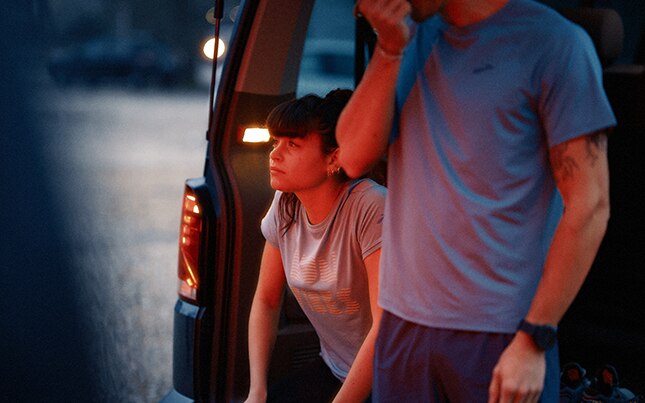Running plateau: Why does it happen and how to overcome it

If you are not currently experiencing a running plateau, you likely have or will at some point in your athletic career. Why does this happen, and what can we do about it? Let's take a look at some of the more common reasons you might find yourself facing a running plateau and what you can do in that particular situation.
As I was preparing to write this, I naturally started reflecting on my own runs. And I realized something both interesting and startling: I am currently experiencing a running plateau. Despite keeping up with my general schedule and routine, I haven't made any real progress in several weeks. In fact, when I used the handy-dandy charting feature on my app of choice, it literally drew a neat little plateau. So, that works out — sort of. I mean, I'm disappointed to learn this about myself and my training, but glad that we'll have the chance to work it out together. Which is exactly what we're going to do, because I'm sure that I'm not alone here.
First, it's important to realize there are several reasons runners — and all athletes — might hit a plateau during their training. Logically, the strategy that will probably work best for you, then, will depend on the underlying cause.
Overtraining
As the term suggests, overtraining is what happens when you push yourself too hard. This could mean you're running too much or at too high of an intensity, or both. Either way, you're demanding more of your body than it's capable of safely delivering. In some cases, you might also experience some aches, pains, and injuries when you're overtrained, but that isn't always the case. Sometimes, your running progress just sort of slows down.
The solution here is both straightforward and counterintuitive. You need to take it easy. This might even mean taking a few days, in some situations up to two weeks, off to fully recover from the stress your body has been experiencing. I know, this feels wrong. The reality, though, is that athletic progress — regardless of the sport — does not happen during your workout. It happens between workouts when you're recovering. Your runs simply provide a stimulus, telling your body "I need you to adapt to this."
Those adaptations, though, take time and energy for your body to complete. So if you've noticed you aren't making progress, it might be that you need to take some time away from the sport so your body has a chance to catch up and make the needed changes.

In the weightlifting world, this is a common practice. Over the years, I've noticed a rhythm in my lifting progress. After about a month or so on a specific routine, I start to plateau and stop making progress. If I try to push through without changing anything, I might even start to slide backward in my lifts, losing strength. But if I take a week or so off, do some cross-training, and focus on recovery, I can usually return to my routine and even lift more than when I last attempted. Because the same physiological principles are at work in running, the same lessons apply. Sometimes, I just need to take a week or two away from running so the marvelous adaptable machine that is the human body can do its work.
If you've been working hard in your runs and start to notice a lack of progress coupled with aches, pains, and a general lack of motivation, chances are you just need to take some time off to recover.
Undertraining
If I'm being totally honest, though, the above-mentioned issue is not what I'm dealing with right now. I haven't been pushing myself too hard on my runs. I love long, easy endurance runs. And I hate, despise, loathe speed training. So, I've been neglecting that part of my training. And that can be a pretty bad thing to do.
To understand why, let's think back to the idea of adaptation we briefly discussed earlier. Your workouts provide a healthy amount of stress, which triggers an adaptation response in your body so when you meet that same challenge in the future, you are faster, stronger, and just generally better prepared for it. If your workouts don't provide enough of a challenge — say by only focusing on easy runs and ignoring anything that really pushes you — the odds are pretty good you'll find yourself at a plateau. Like me.
In my case, the speed workouts I've been conveniently and lazily leaving out of my schedule mean I haven't been doing anything to improve my strength and power as a runner. Of course I'm not seeing much progress. I've basically been asking my body to work longer without giving it the extra strength to do so.
Thankfully, the solution is a simple one: I need to push harder, but safely. In situations like mine, the goal is to use more challenging workouts to bust through the plateau. The exact nature of these workouts, though, will depend on your usual routine. Typically, the idea is to incorporate something currently lacking from your routine that challenges you in a new way. For me, this means interval runs, which I am going to schedule as soon as we're done here. But for you, the problem might be the opposite. Maybe you can feel your endurance is waning. The likely solution, then, would be to focus on that aspect of your fitness by running gradually greater and greater distances. Either way, the goal, in this case, is to challenge yourself in a new way and break through whatever aspect of your routine is holding you back.

Mental and emotional stress
Sometimes, though, the issue is not physical, but emotional. Just like your body can get burned out by cranking out the same workouts consistently, your brain can simply check out. Or, stress in another area of your life may be leaving you so drained you simply don't have the mental and emotional energy to give to your runs. For me, it's about this time of year that my seasonal depression really starts to crank up, making it difficult to focus on just about anything.
Which, upon reflection, could very well be why I've reached this particular plateau. The aforementioned speed runs take a lot of energy and motivation to start, let alone finish. Energy and motivation that I just don't feel like I have right now. Of course, it could also be because I just don't like them.
Whatever the cause, during these times of elevated emotional stress and exhaustion, the best solution is to do whatever it takes to make your workouts more enjoyable for you. This might mean taking some time away from running to focus on a form of cross-training, like Pilates or weightlifting, that you find more fun and relaxing. During especially stressful periods, like the holiday season, it's important to remember there's nothing wrong with going into maintenance mode and just allowing yourself to coast for a little while. Don't worry so much about making progress, just focus on not losing the improvements you've already made.
Look on the bright side
And that brings up an interesting and important point that should not be ignored. Plateaus are not necessarily a bad thing. Of course, they can be deeply frustrating and, as athletes, we feel like we need to be making constant and stunning progress in our training. The reality, though, is that's just not how it works. And that's a good thing.

We all have a life and responsibilities outside of running. Even professional runners have other things they need to think about and care for. An occasional plateau, then, is a perfect time to care for these other responsibilities while holding the status quo in your fitness. Many experienced runners actually schedule this sort of holding pattern into their yearly schedule. For example, in the Southern United States, temperatures frequently hover around the triple digits during July and August. It would be deeply unrealistic for me and my fellow southern runners to try to set any personal bests during that time. A much safer and more realistic course would be to focus on maintenance and start increasing our efforts when temperatures begin to fall.
Of course, as we discussed, most plateaus are decided by your body. Which is a little inconsiderate, to be sure. Still, try to view these plateaus as important messages from your body, rather than just frustrations. By refusing to make progress, for one reason or another, your body is telling you what it needs. And once those needs are met, progress can continue. When you encounter a plateau, then, try to calmly accept it and figure out what's really going on.
All runners, indeed all athletes, deal with plateaus. And these can happen when we're training too hard, not hard enough, or are simply being pulled in too many directions. Whatever causes them, though, running plateaus represent a clear signal that something about your workout routine has to change. Don't be afraid to make those changes, even when doing so means taking some time away from your workouts if that's what you need.
As for me, this current plateau seems to be a combination of things. My dislike for speed runs and the general malaise typically of the colder seasons means that I've neglected some important aspects of my fitness. The plan is a simple one: I'm going to find a way to enjoy speed runs again and gradually reintroduce them into my routine. Thanks for helping me figure that out.
Our writer's advice is intended for informational or general educational purposes only. We always encourage you to speak with your physician or healthcare provider before making any adjustments to your running, nutrition, or fitness routines.

